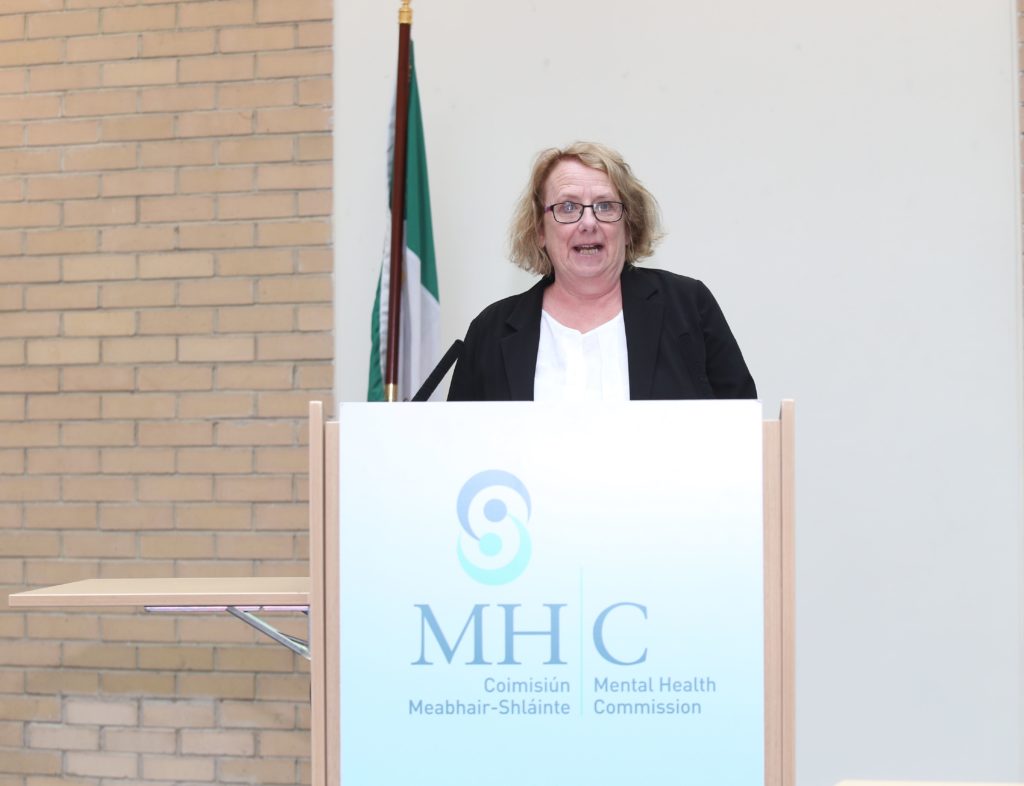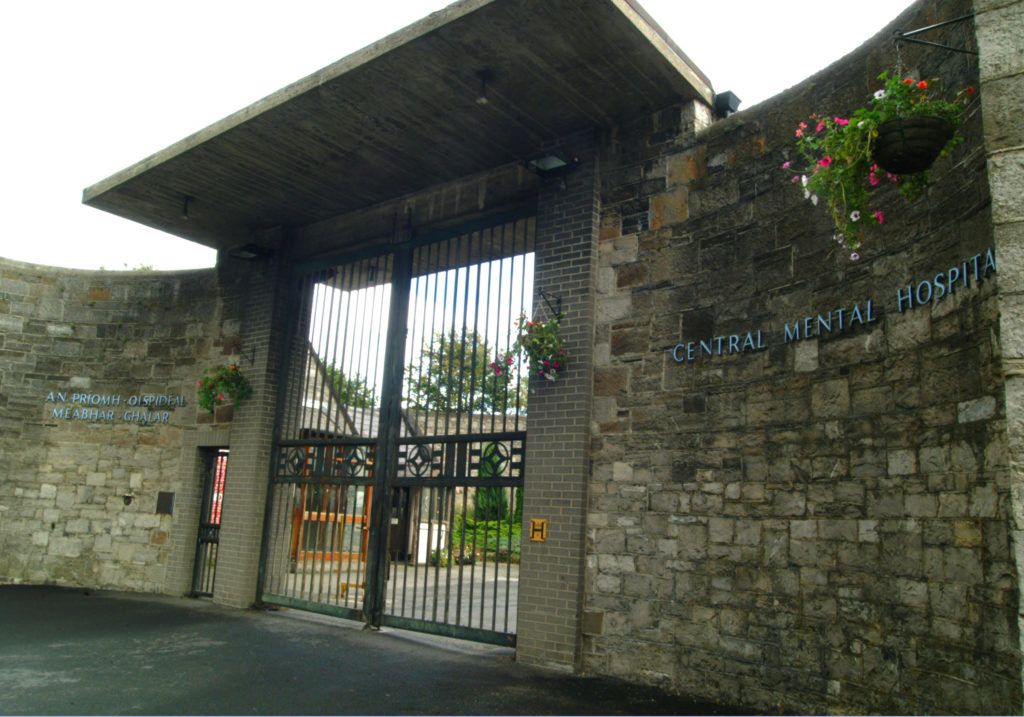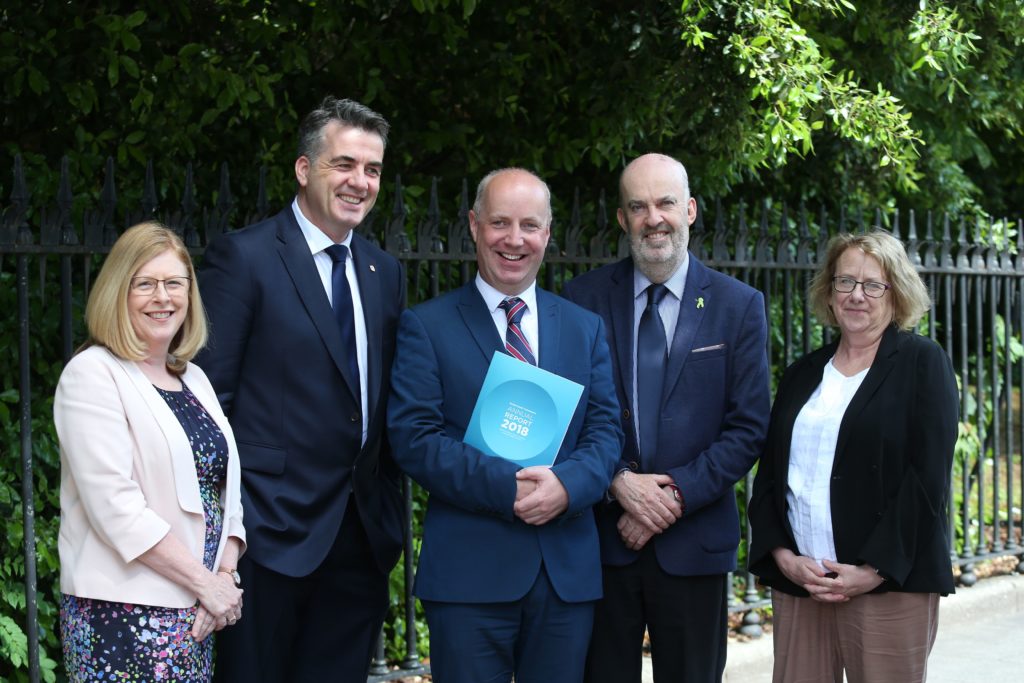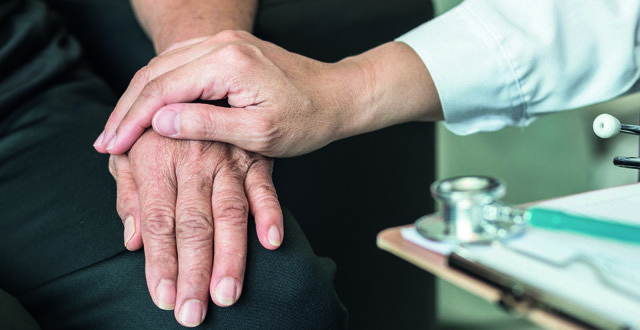Last month Niamh Cahill spoke to Dr Susan Finnerty, Inspector of Mental Health Services at the Mental Health Commission, about its regulatory role, empowering service-users and the need for a greater focus on their overall healthcare needs
Dr Susan Finnerty was working as a consultant psychiatrist in Co Clare when the Mental Health Commission (MHC) was established in 2004.
Her keen interest in learning more about wider mental health services led to her taking up the role of an assistant inspector in 2004, when huge cultural and policy change around mental health services in Ireland was in train.
In 2006, the State published a new strategy for mental health services in Ireland, A Vision for Change, which proposed a major transformation of services nationally.

“I felt it would be extremely interesting to see an overview of the mental health services and to look at improving things and listening to service-users and providing independent reports of the state of the mental health services. It was something I really wanted to do,” Dr Finnerty told the Medical Independent (MI), in an interview conducted last month.
Today, in her role as Inspector of Mental Health Services, Dr Finnerty has a team of 10 assistant inspectors.
“Under the Mental Health Act we must inspect all psychiatric inpatient units, or as they’re called, approved centres, and there are 65 of those. The bulk of the assistant inspectors’ work is inspecting those particular units,” she explained.
Centres are assessed under rules, regulations, and codes of practice and a decision on whether a centre is ‘compliant’ or ‘non-compliant’ is made following an inspection.
Community units
In her role, Dr Finnerty also visits other mental health services, such as community residences and day hospitals, but such services are not subject to regulation under the Mental Health Act.
“We can report on them, but we cannot enforce action on community services, but we can on inpatient services.”
The Commission feels strongly that this should change in order to protect individuals with mental health issues who use these services.
There are approximately 1,000 people resident in about 125 community mental health residences around the country that are unregulated, unlike community residences for people with intellectual disabilities, which are regulated by HIQA, said Dr Finnerty.
“That’s a huge gap and we’ve reported year on year that they should be regulated. With the review of the Mental Health Act at the moment we are hoping that this will actually happen and they will be regulated.”
The Heads of Bill are at draft stage and were received by the MHC for review. The Commission’s recommendations have since been returned to the Department of Health for evaluation. Due to the escalating Covid-19 crisis, it is unclear when this legislative process may conclude.
Transformation
In 2004, when the first inspection was conducted by the commission, 12 Victorian hospitals were under inspection, some of which had five or six wards, each with up to 30 patients.
“Now there are only three such units and they have only a handful of patients and one ward each,” noted Dr Finnerty.
One of these is the Central Mental Hospital, which is due to move to a new facility at Portrane, Co Dublin.

Another is located in St Davnet’s, Co Monaghan and residents there will move to a new unit this year. The third is at St Fintan’s in Portlaoise.
“That’s just one ward and there are plans to move that as well.”
The plan to close hospitals, Dr Finnerty added, had “gone well over the last 16 or so years”.
As part of the hospital closure plan, investment was promised for community services and over 100 long-stay community residences were opened.
Unfortunately, these residences were rolled out with little or no rehabilitation services, only partially funded community teams and no specific investment in primary care, according to Dr Finnerty.
“We now have about 125 community residences with about 1,000 residents with little or no prospect of moving on, the way things are at the moment.
“We have over capacity, which means extra patients in acute units, mainly due to the lack of 24/7 community services that aren’t properly resourced and CAMHS [Child and Adolescent Mental Health Services] with no emergency part to their service.
“The investment in community services just didn’t happen and I think we’re struggling now to catch up.”
Staffing
The lack of staff in mental health teams nationwide is a familiar problem to those working in the sector.
The difficulties are due, in part, to a worldwide challenge in recruiting health staff, said Dr Finnerty. The problem is not helped by the fact that the HSE is in competition with private services for staff.
“Even posts that are approved, funded and vacant we can’t fill,” said Dr Finnerty.
“It is very hard to attract people to work in areas where they are already short staffed because they are very isolated and it may be a distance from a centre of learning and there isn’t much to attract them. It’s like a vicious circle. The less staff you have the less staff you’re going to get. It’s very difficult for the services.”
The majority of inpatient units have adequate nursing staff and consultant psychiatrists in place.
The real staffing problems are in the community, Dr Finnerty advised. She pointed out that “it’s very difficult to provide a service with only half a team”.
This results in long waiting lists, areas of the country without rehabilitation services, and a huge regional variation in service provision.
Currently, some areas are well-staffed while others “really struggle”, said Dr Finnerty.
“It’s a bit of a postcode lottery. It’s very hard to figure out how some places get more resources than other places. I’ve looked at deprivation, I’ve looked at the closure of old hospitals freeing up resources and there is no pattern to it.”

Solutions
Attention is required on the community provision of mental health services in order to bring about improvements, according to Dr Finnerty.
This means increased investment, funding community mental health teams, 24-hour access to mental healthcare and the introduction of home-based treatments to “free up” acute beds, she advised.
If more services were provided in the community there would not be such “a rush on acute beds”.
“Providing inpatient care is very expensive, when you look at funding. What happens is people may be admitted in order to get them through the night or the next couple of days. But if you had proper community services that could be tackled in the community.
“Ninety per cent of mental health problems are dealt with in the community. Only 10 per cent need specialist services and of that number only 1 per cent need inpatient care. But we spend an awful lot of money on inpatient care.
“I don’t want to leave you with the feeling that everything is bad, it’s not. Staff work really hard and very imaginatively and creatively to provide services for people. Some of the new units are really lovely, with single rooms, therapy rooms. When it is there, it is an extremely good service.”
Integration
Dr Finnerty would like to see greater integration between mental healthcare services and other healthcare services.
Currently, services such as dietetics, speech and language therapy, and physiotherapy are more difficult for some people with mental health problems to access, compared to individuals who do not have mental health problems.
“This is discrimination. There is no other reason they are being refused other than that they have mental health problems,” argued Dr Finnerty.
“Only this week I heard of a patient in an acute mental health unit who had a clear need for physiotherapy and couldn’t receive this service because she was in a mental health unit. But in the same hospital, in a general ward across the corridor, patients were entitled and got the service. That’s just wrong.”
Dr Finnerty added that since the commission highlighted that the physical needs of mental health patients are often overlooked, or not properly assessed, the situation had somewhat improved.
Yet despite some improvement, the provision of services “is still patchy”, she added.
Physical health monitoring of patients in hospital, especially those there for longer than six months, has improved following huge efforts by staff.
Codes of practice
Codes of practice around the seclusion and physical restraint of residents in approved centres require a number of elements to be followed and compliance in this area is a cause for concern.
Dr Finnerty acknowledged that it can be difficult in emergency situations for staff to follow codes of practice.
But she stressed that if you are depriving someone of their liberty, it has to be done in accordance with best practice.
Compliance ratings “haven’t been great” to-date. However, Dr Finnerty noted: “I think there is a slight improvement in compliance in those areas this year, but that remains to be seen.”
Mental health services in Ireland are familiar with inspections being undertaken; there has been an inspector of mental hospitals here since the mid-1800s.
Times have moved on in terms of regulation and culture, but services still “go out of their way to be compliant and we try to work with them as much as we can,” remarked Dr Finnerty.
She said that services work very hard between inspections to introduce improvements and “compliance is improving slowly”.
“Rarely do we come across any hostility or non-cooperation; that is very rare. We are quite confident approved centres and staff want to work to improve quality.”
Attitudinal change
The Commission is seeking clinician attitudinal change “from doing for, to doing with”.
Clinicians can be quite “paternalistic” and have a “we know what’s best for the patients” attitude, explained Dr Finnerty.
Individual care plans, which set out what patients want, are being put in place to change this. A joint working approach is being sought around what the “service user wants and needs”.
“Sometimes decisions that people make may not always be wise ones, but they are entitled to make those decisions and to get help from people,” stated Dr Finnerty.
“There will always be people that are very unwell and don’t have capacity and are very delusional, but in most cases that passes and it’s treatable and then they’re in a position to make their own decisions… It’s a difficult move from best interests to will and preferences.”
CAMHS
It is well known that child and adolescent mental health service (CAMHS) teams are not fully staffed, with some even lacking a consultant psychiatrist, Dr Finnerty pointed out.
CAMHS teams are there to assess and treat severely mentally ill children, but due to a lack of child and adolescent mental health services in the community, it often finds itself being used to assist children and teenagers who do not fit into this category.
Furthermore, there is only one emergency CAMHS bed in Ireland, which is located in Galway. The bed is kept free for emergency cases.
In cases where a CAMHS bed is unavailable, a young person is admitted to an adult unit or given an appointment to see a CAMHS team in the near future.
“It’s very difficult and I really feel for parents that are at their wits end and may end up seeing their child in an adult unit or may have to take their suicidal child home with them. It’s very difficult,” she said.
“Recruitment is a big problem. A number of vacancies are approved and funded, but they can’t fill them. Wexford in particular has a great difficulty.”
Dr Finnerty also welcomed the recent recruitment of assistant psychologists in primary care for young people.
More emergency beds would help, along with the introduction of a 24-hour CAMHS service to ensure that if a young person comes to an emergency department, they are assessed by a specialist in child and adolescent mental health to allow supports to be put in place, stated Dr Finnerty.
Covid-19
No part of the healthcare service is immune to the impact of Covid-19. Last month the MHC had already moved to suspend all physical inspections of approved centres.
The Commission moved to introduce a range of precautionary measures to its regulatory and tribunals processes due to the Covid-19 pandemic.
Under the Mental Health Act 2001 all involuntary patients are entitled to have a mental health tribunal within 21 days of admission.
The function of the mental health tribunal is to either revoke or affirm an admission or renewal order and the Commission is responsible for establishing these tribunals.
It was decided that where there was no indication of Covid-19 in an approved centre, the tribunals would continue as usual. Where there was a suspected or confirmed case, alternative arrangements were being agreed in relation to the holding of tribunals.
The Commission had written directly to all approved centres requesting that they notify it of any confirmed or suspected cases of Covid-19.
Dr Finnerty said she had no concerns relating to the physical healthcare needs of residents in mental health units in the wake of the Covid-19 outbreak, if advice is heeded.
“As things stand, I have no reason for additional concerns in relation to the physical healthcare needs of residents to those that I outlined in my report last year, as long as each centre monitors and follows national health/HSE advice and best practices on an ongoing basis, whether or not a case of Covid-19 is identified in their operational area.”













Leave a Reply
You must be logged in to post a comment.